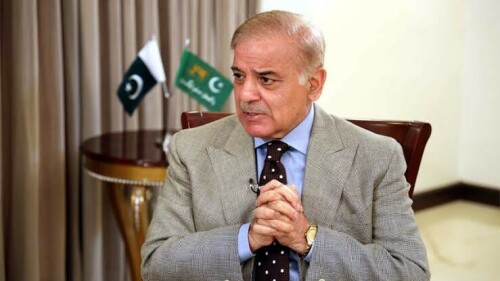ISLAMABAD, Nov 16: Pakistan had to go to the IMF for an unpopular ‘standby agreement’ to avert an economic meltdown because the government suffered a ‘trust deficit’ which did not allow it to use other options with success.
An official in the finance ministry said on Sunday that allies in the West and Asia had pressed the government to seek International Monetary Fund’s assistance before they could commit a bailout package. “There was a lack of trust.”
A source in the Foreign Office said the countries doubted the government’s ability to improve its economy without the fund’s oversight.
Only China offered to give $500 million, which came two days ahead of Pakistan’s formal request for loan to the IMF.
On Sept 19, then finance minister Naved Qamar and State Bank Governor Shamshad Akhtar had announced that the government would not go for the IMF programme. The announcement was followed by some unpopular decisions, including the ending of subsidies on oil and gas and phasing out the subsidy on electricity by June next.
Prime Minister’s Adviser on Finance Shaukat Tarin also said that the IMF was the last resort.
A technical-level meeting of the ‘Friends of Pakistan’ forum will be held in Abu Dhabi on Monday or Tuesday to discuss Pakistan’s request. It will be followed by a ministerial level meeting in December, the finance ministry official said.Mr Tarin told Dawn that the government had got its proposals approved by the IMF to build dwindling foreign exchange reserves.
He said no new tax would be introduced under the package and the performance of the tax machinery would be improved over a period of time.
“We have only committed to the IMF to increase the tax-to-GDP ratio to 15 per cent from over nine per cent in five years,” Mr Tarin said.
Finance Secretary Dr Waqar Masood Khan claimed that the loan would have no direct impact on the poor. He said the home-grown package carried safety nets for the wellbeing of the people.
He said the government had decided to reduce the budget deficit to 4.3 per cent and current account deficit to 4.5 per cent. He said reducing the deficits was part of the this year’s budget.
Dr Khan ruled out imposition of agriculture tax or increase in toll tax. “We have only to plug the loopholes in the taxation system.” He said the target for general sales tax collection would be increased in view of over 24 per cent inflation.
He said other conditions agreed with the IMF included reducing non-development and other expenditures, free float of exchange rate, zero borrowing from the SBP and increasing interest rate to tame core inflation.
An official in the economic affairs division said the IMF of today was different from what it was in the 1990’s. He said the G-20 meeting in Washington had also asked the IMF to avoid imposing harsh conditions for releasing loan to vulnerable countries.
He said the country’s credit rating would improve in the next few weeks because of the IMF loan which would boost investors’ confidence.















































Dear visitor, the comments section is undergoing an overhaul and will return soon.